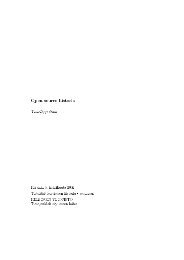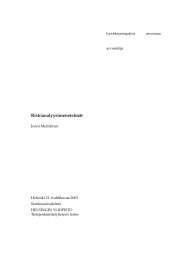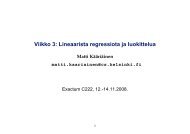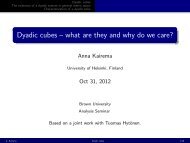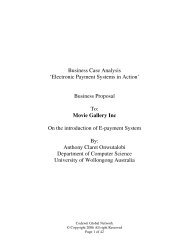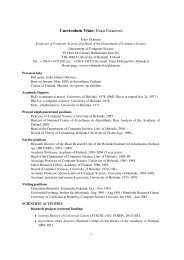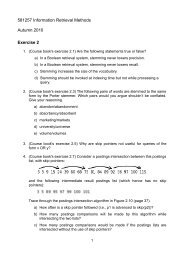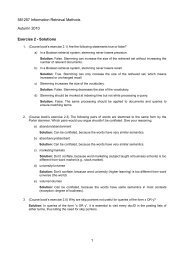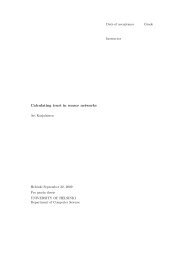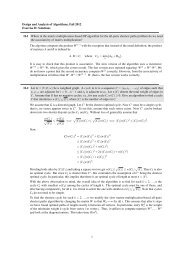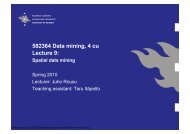Toni Sihvonen (order #92780) 62.142.248.1
Toni Sihvonen (order #92780) 62.142.248.1
Toni Sihvonen (order #92780) 62.142.248.1
Create successful ePaper yourself
Turn your PDF publications into a flip-book with our unique Google optimized e-Paper software.
<strong>Toni</strong> <strong>Sihvonen</strong> (<strong>order</strong> <strong>#92780</strong>) 6<br />
Advanced Saxon Character Generation<br />
Review the Advanced Character Generation system<br />
(Pendragon pages 47-58). Many of these rules, like the<br />
rolls for Statistics and Traits, can create more idiosyncratic<br />
Saxon characters. The following rules expand that system.<br />
Recommended Rule: Improved Previous Experience<br />
As noted in Basic Saxon Character Generation Step 8, all<br />
Pendragon characters now gain three Previous Experience<br />
Benefits per year between the year they turn 15 and the<br />
year they enter play. This new rule gives players more<br />
fully developed starting characters, enables PCs and NPCs<br />
to reach professional adulthood at a more realistic age,<br />
and encourages often-neglected skills like Compose or<br />
Falconry by forcing players to spread their benefits over<br />
three ratings each year. Most characters will now enter<br />
play between ages 21 and 25. Gamemasters may even<br />
require characters to enter play no older than 25.<br />
This recommended rules revision is best introduced at<br />
beginning of a new Pendragon campaign. Introducing it<br />
into an existing campaign requires careful consideration,<br />
since it may favor new characters over old characters.<br />
Optionally, gamemasters may give old characters one or<br />
two extra Winter Phase Training and Practice Benefits per<br />
year until they “catch up,” phasing these Benefits in over<br />
six or more winters.<br />
Recommended Rule: Winter Phase ’Raining and Practice<br />
This note applies to Training over Winter by established<br />
characters (Pendragon page 186). Generally, characters<br />
receive the same Training and Practice as before: one<br />
Benefit per year. The two extra Benefits gained in<br />
Improved Previous Experience represent hypothetical<br />
“experience checks” resolved during the unplayed adolescent<br />
years. In that light, gamemasters may spend three<br />
Winter Benefits per year to update non-player characters,<br />
or player characters who are utterly out of play (no<br />
adventures, no solos) for years at a time.<br />
Note that under both new and old rules, Winter Training<br />
lets you increase skills that start at 0, while Previous<br />
Experience does not.<br />
Optional Rule: Improved Family Characteristics<br />
As noted in Basic Character Generation step 7, players can<br />
use Father’s Class benefits (only) to increase a Family<br />
Characteristic up to its bonus +15 (hence up to 20 for a<br />
+5 bonus, and up to 25 for a +10 bonus). After the<br />
Father’s Class step, these skills increase by normal rules.<br />
This rule encourages character idiosyncracy. Use it if you<br />
feel that skills like Singing, in your campaign, are too<br />
rarely increased or attempted. This must be weighed<br />
against the risk of too cheaply increasing a skill that is<br />
actually crucial to your game - which Singing might be<br />
in a campaign centered on bards, for example.<br />
When using this rule, a character passes on only 1/2 the<br />
normal bonus to his child if he has not increased his<br />
Family Characteristic by at least 5 points by the Winter<br />
Phase when the child is conceived. A GM may allow a<br />
child to be a “throw back” to previous levels of skill.<br />
British Characters for the Saxons! Campaign<br />
Create British characters using the phase One Character<br />
Generation rules from The Boy King, and from the notes<br />
in the “Chronicle” chapter of this book. Without The Boy<br />
King, use Roman or tribal Cymric characters from<br />
Pendragon.<br />
Mixed Children, Foster Children, Stepchildren<br />
Many heroes come from complicated families. You may<br />
choose a mixed family background as a role-playing exercise,<br />
or to reflect campaign or Lineage events.<br />
Mixed Children<br />
Children may have two sets of cultural-determined<br />
Statistic modifiers due to intermarriage, raider rape, or<br />
the begetting of bastards upon foreign concubines. You<br />
may use any combination of your parents’ Statistic modifiers,<br />
as long as your net Statistic gain does not exceed<br />
+3. Example: A CymridSaxon may choose from the following<br />
Statistic modifiers: +3 CON, +3 STR, +3 SIZ, -3<br />
DEX. He may use part or all of any of these modifiers, as<br />
long as he does not gain more than a net +3 to his statistics.<br />
He might choose -3 DEX and +2 to each of CON,<br />
STR, and SIZ, or -3 DEX, +3 STR, +3 CON, among many<br />
combinations.<br />
Mixed children gain both sets of Cultural Trait modifiers,<br />
but reduce each modifier by -1. These may cancel each<br />
other out (+1 Chaste, +1 Lustful = 0). Mixed children<br />
inherit Family Characteristics from their fathers.<br />
Foster Children<br />
First, work with your GM to decide why you were fostered.<br />
Were your parents slain by enemies, leaving you in<br />
the care of your uncle, or are you a hostage to the good<br />
behavior of your birth family? Some cultures (the Irish<br />
and the Picts in particular) customarily foster out noble



